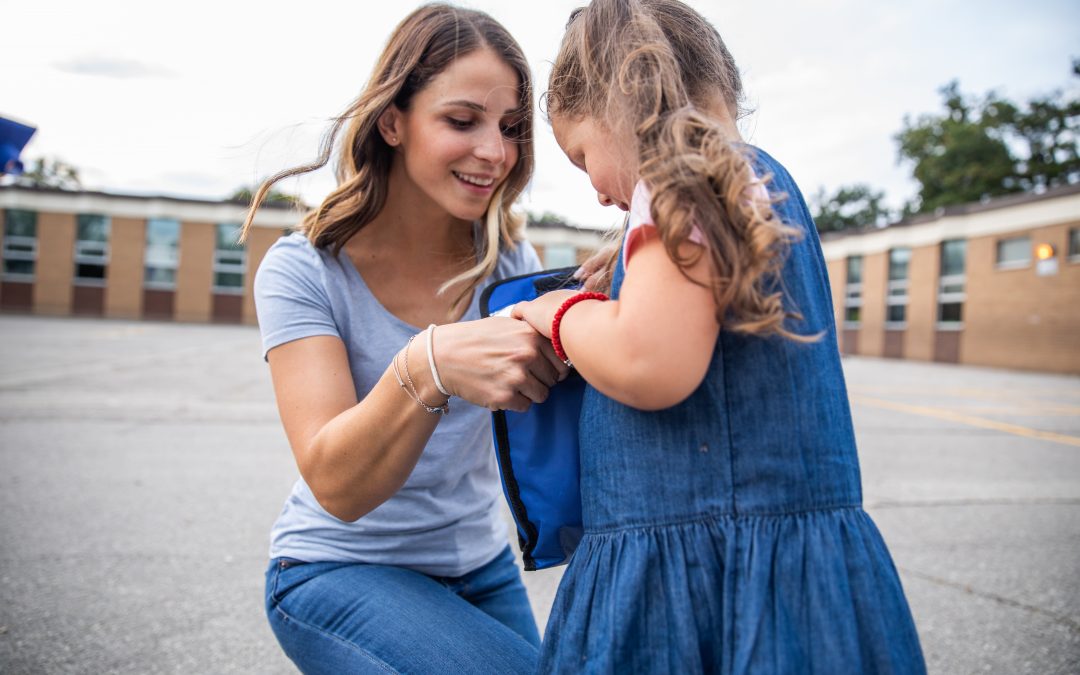Some parents dread the start of the school year, having enjoyed lazy mornings and extra snuggle and play time with their children. Others of us jump for joy knowing our kids will be back in their routine and we have a nine-month hiatus from arranging camps and managing kids with too much time and too little structure. Regardless of whether you’re already feeling nostalgic about less time with your kids, or can’t wait to push them out the door, here are a few tips to ease the transition into the school year:
-
Get some zzzz’s
Neuroscience has repeatedly found that adequate sleep plays a significant role in children’s academic success. School aged kids need 10 to 11 hours of sleep each night!
-
Recognize your child’s anxiety
Going back to school can be stressful for kids of all ages, so face this stress head-on and talk about it with your kids. Whether it’s your kindergartener’s first time at school, or your 9th grader’s fear of getting lost at her new high school, talk with your children about new experiences, and tell stories about your own fears and challenges and how you managed them. You can do this in a playful way, and even use role-playing. Remind them of ways they are capable and brave—and give specific examples of their skills and traits that will help them overcome their fears.
-
Ease back into routines
Bedtimes? Limited screen time? Homework? When kids are used to running around outside until dark on summer nights, shifting to the early morning school-bus rush can be a shock to the system. Try moving toward their typical school day schedule before school actually starts, to give their minds and bodies a chance to get used to going to bed and waking up earlier.
-
Steamline morning routines
Anxiety can run high in the mornings, resulting in tension, conflict and meltdowns. Clear expectations and consistent routine can help. Try using a dry erase board or other visual aid with tasks your child needs to complete on their own—for younger kids you can use drawings of a toothbrush or shoes to remind them what they need to do. Giving specific praise when children complete tasks lets them know that you’re paying attention to their independence and hard work. And for additional time savers, try making lunches and picking out clothes the night before. You may want to try ‘closing’ kids rooms or play areas once they are dressed, to avoid dawdling, or having them become engaged in a game only to be told it’s time to go.
-
Let them struggle
The academic and social challenges of school can be hard. Help kids develop resiliency and improved self-esteem by letting them fight their own battles when appropriate. It’s tempting to rescue our children and solve their problems for them, especially when they’re fried after a long day at school; however, tidying up their room and putting the finishing touches on their homework can send a message that we don’t think they can do this themselves. If we treat our kids as if they’re fragile and incapable, it reinforces an inner narrative that this is the case. Letting them struggle might be messy and uncomfortable, but we’re often doing them a favor in the long run.
Returning to school after the summer break can be a stressful time for kids and their parents. Tears and meltdowns aren’t uncommon, but if you’re worried that your child’s struggles are out of the ordinary, or simply want some additional tools to help manage stress, contact us to request a FREE 20-minute call with one of our licensed professionals to discuss what you are grappling with.
Alyse Clayman, LCSW, is CCY’s Early Childhood Mental Health Program Director and Clinical Supervisor.



